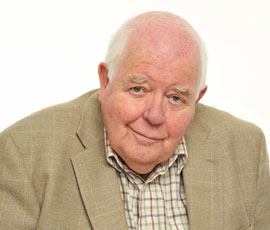OPINION: David Richardson’s weather sayings

I may have mentioned this before, but in the context of recent weather it’s worth repeating. A few years ago I sat (silently) in a focus group on how consumers viewed farming.
It took place in East London and involved about a dozen ladies. The independent organiser of the session had been asking their opinions on such issues as home-produced compared with imported foods. Unsurprisingly, most did not differentiate between the two – except that they said they usually chose the cheaper.
Then the organiser introduced the subject of the effects of weather on prices and what they purchased. For a moment the conversation stalled. Then a woman from the East End piped up and in a genuinely puzzled voice asked: “What’s the weather got to do with the availability or the price of food?”
That exchange illustrated part of the problem we farmers have with consumers’ lack of knowledge. And it’s not just Londoners who know little about our industry. In the days when I spent time in the Norwich studios of Anglia Television I was standing in the queue for coffee one September morning next to a lady who lived in a village near the Norfolk Broads. “Hello,” she said, “I haven’t seen you recently. Have you been on holiday?” I replied that I had been harvesting grain and that it took precedence over TV. “Oh, is it harvest time?” she asked. “I hadn’t noticed.” And she drove past corn fields for 10 miles each way to get to and from work.
It seems unlikely, therefore, that most consumers will be conscious that spring drilling has been delayed by wet, cold weather on all but the lightest land or of the implications.
Even where seeds have been sown, there will be little growth while temperatures stay low. And that does not auger well for yield prospects. My late father used to say spring barley should germinate and grow from the moment it is planted. To ensure that, he said, before drilling, the farmer should take down his trousers and sit on the seed-bed and not feel cold in his nether regions. He had similar advice about planting sugar beet.
Last year, our beet land passed that test (well, let’s say it did) on 29 February and our entire acreage was in the ground by 2 March. This year, with land still saturated and having lakes in places from months of rain, and with snow falling every other day and frosts most nights, there’s no hope of drilling anything as I write. And there probably won’t be until April at the earliest. And late drilling means low yields.
My father also used to say that to have good potential, winter wheat should “hide a hare in March”. In other words, it should be well enough grown by the end of this month for a crouching hare to be invisible. That tried-and-trusted rule of thumb, which is just as true today, also looks set to be missed this year. And yes, I know, it’s as bad or worse in other regions, and grass for livestock isn’t growing either. If my fears are valid, 2013 will be the third poor year in succession in some parts of the country.
A couple of weeks ago I was in Egypt and thought of the seven fat years followed by seven lean years in the ancient Pharaoh’s dream as interpreted by Joseph. It’s beginning to feel a bit like that here – except we didn’t have the fat years first.
David Richardson farms about 400ha of arable land near Norwich in Norfolk in partnership with his wife Lorna. His son, Rob, is farm manager.

